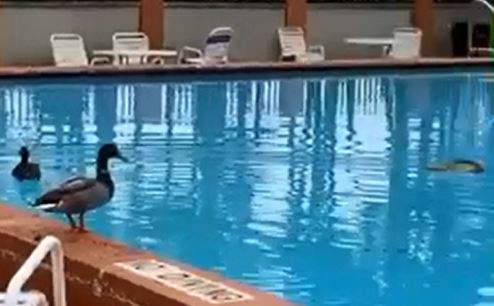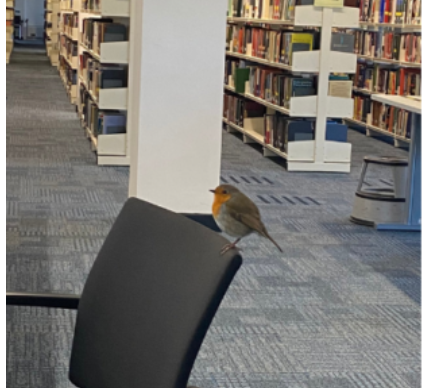We’ve reported here on more than a few occasions about the important role played by various creatures on our campuses. From animals in halls to prominent pets and from birds behaving badly to the Beasts of UoN, lots of critters have had prominent parts in university life.
There have also been some strange goings on with goats charged with campus weed maintenance projects and who can forget the achievements of Furry Boi, the squirrel who won a student election. Beyond squirrels and goats, there have been more challenging campus critters to deal with including a range of raptors at a couple of universities as well as a very active goose.
And then there was the recent news of the surprising number of cats inhabiting university libraries.
But lockdown has brought some new animal based excitement to university campuses.

One college had a bit of a problem with ducks making themselves at home in its outdoor pool. The maintenance staff were desperately trying to stop the ducks from making a mess inside the pool area. They came up with a snappy solution:
Flagler College, a private liberal arts college in St. Augustine, tried to solve its pesky duck problem at the pool by placing a fake gator head in the middle.
The only problem? The ducks don’t care.
Just mere hours later, the waterbirds had made friends with the fake gator head and owl statue placed by the pool.
Some smaller birds have been making their presence felt in the University of York’s library apparently. Robins have been flying in and out of the library all day long apparently because of the windows being kept open for ventilation.
As The Tab reports:
Students working in the library have even been tweeting pictures of the robins who they’ve named their “study buddies”. The robins have been visiting so regularly they’ve been given names by students, with one bird being named “Stan.”
Regular visits by these new “study buddies” have caused a thread of tweets solely devoted to them, with the Uni of York Library even creating a “Student Card” for the little birds.
This comes as robins have been using the library since January, when they were first seen paying the library a visit. Since then, the robins have been spotted on the library floor, under desks and even on chairs.

In those halcyon pre-lockdown days we learned about the hilarious japesters at Rutgers University where a group of students placed a dead lobster in a tree and then jokingly made ‘pilgrimages’ to it.
Each September, the university’s dining halls offer “a smorgasbord of seafood in their annual King Neptune Night”. Students stole a lobster and stuck it up a tree.
Although the crustacean slowly rotted away over its three-week stay in the tree — presumably removed by university officials on Oct. 18 — students have come to memorialize its presence with a new make-shift lobster made out of pinecones and tape. Others have even joked about starting a petition to make it a historical monument on campus.
One student commented the new makeshift lobster (who happens to be named Boris) that “It’s gotten like a cult and religious following,”
Back in the autumn of 2019 the University of Texas had some unwelcome visitors in its music school building. It spent nearly $15,000 on the trapping and removal of raccoons from the Music Building and Recital Hall, which houses UT’s Butler School of Music:
“While we’re sure the raccoons were drawn to the melodious music they experienced coming from the Butler School of Music, we couldn’t allow the unexpected visitors to remain in residence for long,” said Alicia Dietrich, spokeswoman for the College of Fine Arts. “Once their presence was known, the school safely removed and relocated them to a wildlife rescue service.”
Using wire-mesh “hog panels,” concrete, and mechanical fasteners, pest control workers sealed pipes, gates and other openings in the foundation of the MRH building where raccoons had been able to enter the basement.
After the entrances were sealed, the workers set out to trap and remove any wildlife still in the building. The traps were placed in “high raccoon activity areas” and checked daily for two weeks. Any captured raccoons were taken to a wildlife rescue service, quarantined and then released onto private sanctuary properties.
Apparently raccoons are extremely common and flourish throughout North America during the year but when it gets colder they find their way into buildings, including universities, seeking warmth. Removal is clearly a costly business.
But raccoons do seem to be an ever-present feature at the University including a mischievous intruder called Buddy who does seem to have built up a rapport with the students. Fortunately the University has an ‘Animal Make Safe Program’, which monitors wildlife on campus and responds to animal incidents. They don’t seem to have dealt with Buddy yet though.
Animal antics have not only been happening on campus but also online. It’s old news perhaps but who hasn’t had a goat in their online meeting?

Need a fresh face to brighten up your video conference meetings? Want a fun experience for an online Happy Hour? Looking for a virtual tour? The Sweet Farm Animal Ambassadors are here for you.
What happens on a call, you say? We will join your call, do a quick intro of the farm and introduce you to the animals on your virtual tour! You can ask us questions or just hang out.
And then as that little bit of extra support for academic colleagues there are these ever delightful validating ponies who are always there for you. It’s something for the difficult times.

It’s reassuring that there is a place for all these animals in higher education.












